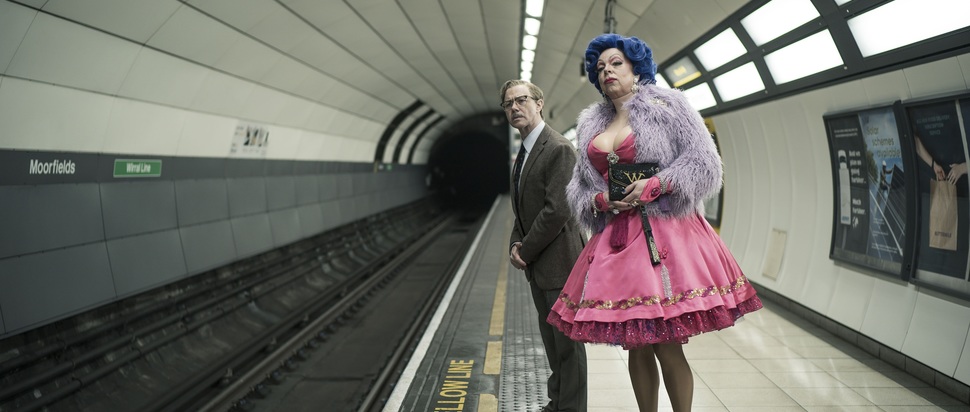Bait and Switch: 10 Years of Inside No. 9
Ahead of its final series, a look back on the compelling, confounding and constantly changing world of Reece Shearsmith and Steve Pemberton's Inside No. 9
“‘Why don’t you do a number 9 bus?’ Alright cunt, what happens?” - Reece Shearsmith on Richard Herring’s Leicester Square Theatre Podcast, 14 Sep 2022
It’s unclear who first seeded the concept of a bus episode of Inside No. 9, or when, but by the time promotion for 2022-23’s series eight came around, the journey was well underway. There was a promotional poster, aping 1970s comedy On the Buses; a confirmed guest star (Robin Askwith); bus-themed scenes in the trailer; and even a candid photo leaked of the cast filming in busman’s uniforms.
But just before Hold on Tight! was supposed to air, a BBC continuity announcer announced a schedule change and a new quiz hosted by Lee Mack, 3 by 3, would show instead. What followed began as a run-of-the-mill game show, but slowly devolved into a family-in-crisis supernatural short story evoking, to name a handful of influences, Carrie, Matilda, Rosemary’s Baby and Scanners – screamingly Inside No. 9 all along.
Social media immediately flooded with praise, confusion and complaints, but this wasn’t the first time writers Steve Pemberton and Reece Shearsmith had pulled off this kind of chicanery.
Playing with storytelling, grotesquerie and loading their work with references to cult horror and vintage TV has been in the duo’s arsenal for decades. Along with Mark Gatiss and Jeremy Dyson, their first show, sardonically titled The League of Gentlemen, was an initial act of trickery to fool audiences expecting an Oxbridge-style revue. They got men in suits, sure, but men who fed the audience sketches that descended into horror and uncanniness. This risk took them to the Edinburgh Festival Fringe 1997 where they won the Perrier Award – the first time a sketch show had won since Writer’s Inc in 1982. Twenty-five years later, what makes Shearsmith and Pemberton stand out as some of the best modern storytellers, particularly during the ten years of Inside No. 9, is this consistent ability to bait and switch their audiences' expectations with multi-layered cat-and-mouse mind games.
Inside No. 9’s Dead Line (2018) might be their most audacious example of a you-had-to-be-there TV event. Billed as a live Hallowe’en special, the show began as normal, before suffering sound issues, then dropping in and out of broadcast. One quarter of the viewership changed the channel. For those who stuck around, the remaining episode was a delicious little mindfuck: a kaleidoscope of techno-horror, live ‘suicide’, real-time tweets (‘Are me and Steve Pemberton on BBC Two now?’) and Ghostwatch-inspired mischief. The whole event was a multi-level attack, beginning before the episode was broadcast with planted news articles about rehearsals plagued by dead former Coronation Street stars, and ending with the audience’s live reaction becoming an inherent part of the viewing experience.
Of course, the kind of storytelling embraced by Pemberton and Shearsmith goes further than how the show is presented and consumed; what it portrays is just as unexpected and compelling. As a horror comedy, Inside No. 9 has followed its League of Gentlemen and Psychoville predecessors to remain unafraid to delve into the dark, the tragic and the mundane-turns-unnerving.
In The Twelve Days of Christine (2015), Sheridan Smith plays a woman whose life unravels before her eyes. Terrifying and heartbreaking, the episode illustrates the lack of control any of us really have over our fate. But that was seven series ago, and the writers’ maturity and thoughtfulness in exploring grief, loss, abuse and madness has deepened and expanded since. After a decade’s worth of uncompromising episodes, 2023’s The Last Weekend and Love is a Stranger show multifaceted, complicated, troubled characters – a man who just wants to love and be loved; a woman, untethered, whose life has passed her by – that you root for no matter how many lives they ruin, simply because they are horrifyingly, unthinkably relatable. These stories are exposing, forcing us to reflect on how we relate to the world and each other: why are we empathetic; what do we see of ourselves in these characters; why are we crying right now, and for whom?
Two episodes from the final series were previewed in March at the BFI: episodes so intensely assured and top-of-their-game that it seems wild the show is coming to an end. Barring these, there’s a predictable secrecy surrounding what else to expect from the final series. Regardless, it’ll be the writers’ complexly sympathetic characters and bittersweet approach to devastating situations that will keep Inside No. 9 burning at the forefront of televisual storytelling for years to come.
Inside No. 9’s ninth series is set to be broadcast this spring, air dates tbc; all other episodes of Inside No. 9 are currently available on BBC iPlayer
Listen to Kirstyn's Inside No. 9 podcast – There's Not Always a Twist – whereever you get your podcasts
